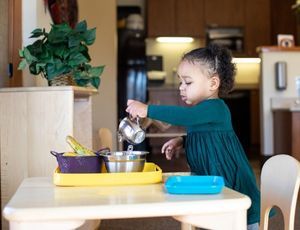Helping Your Child to Deal with Aggressive Behavior
Sooner or later, as our children enter their world of peers, they will confront the child whose interaction with them is negative or even physically aggressive. When this happens, as parents we come face to face with a painful truth: what hurts our child, also hurts us. The feelings we experience in this scenario tend to be instantaneous and can set off emotional triggers – our natural instinct is to protect. Once when my daughter was 18 months, she stumbled and fell, skinning her knee on the pavement. Her grandmother saw fit to try to shield her from one of life’s realities and immediately leapt into action in an unforgettable display, scolding the concrete – “Bad, bad sidewalk! No, no, no – you do not hurt our baby!! BAD !” As extreme and funny as this example seems, it calls attention to the fact that insight can guide us in helping our children to deal constructively with some of the painful hiccups they will inevitably experience in life.
Patty Wipfler of Hand in Hand Parenting points out that “in every aggressor/victim encounter, both children need help.” Armed with a few guiding insights, we can prepare ourselves and our children to better handle the verbal and physical confrontations that arise in their lives. Wipfler recommends the following strategies:
- “A hurt child will heal well if you listen.” When your child is hurt, move in close, put your arms around him, make eye contact and give sufficient time for him to fully express his feelings. Offer a few words of reassurance, but mainly comfort your child and allow him to cry and process what happened and what he is feeling. Allow your child to express his feelings until he feels calm again. Take care of any physical injuries.
- “Reassure your child that people are good at heart.” Believing that others are bad disempowers all of us. Explain that sometimes others may do hurtful things because they are having a bad day, they are not getting what they need, or they themselves are hurting inside. Reassure your child that she did nothing wrong.
- “We grownups are responsible for children’s safety.” Adults must anticipate the potential for aggressive behavior and as much as possible plan to set boundaries to prevent children from being victimized and harmed.
- “Empower a less confident child, one small step at a time.” When your child is victimized by another child and has regained his composure, offer a small step that doesn’t involve confronting the aggressor, but helps to remedy the injustice, e.g., “Would you like me to help you find your hat that Joey threw over the fence?” Do not force the action if your child does not feel confident enough to take this step, but continue as occasions arise to offer and support this option. When your child is comfortable with retrieving his hat, you may then encourage the next step in assertiveness by asking, “Is there something you would like to say to Joey?” At first, offer to simply stand with your child and coach him with his words, if necessary: “Joey, I didn’t like it when you took my hat and threw it over the fence. I don’t want you to do that.” With enough practice, your child may soon be able to take this step independently.
- Refrain from forced apologies, which do not help either the victim or aggressor and may actually promote resentment and encourage dishonesty. Instead, model respect for the aggressor as well as the victim. Avoid blaming the aggressor and pitting the two children against each other. Show faith that the child who has been victimized can heal and empower himself. Explain that the aggressor is demonstrating a need and requires support to change his or her behavior.
Resources:
http://www.todaysparent.com/family/parenting/pushover-kids/ https://www.psychologytoday.com/blog/passive-
Cool, Calm and Confident: A Workbook to Help Kids Learn Assertiveness Skills, by Lisa M. Schab






